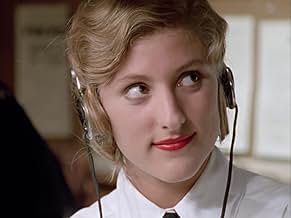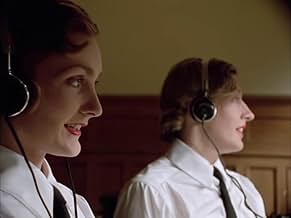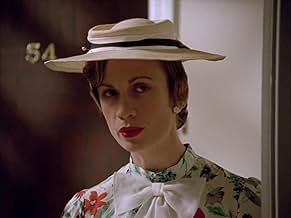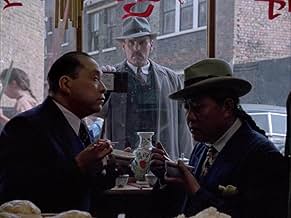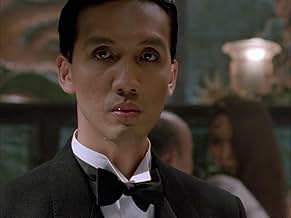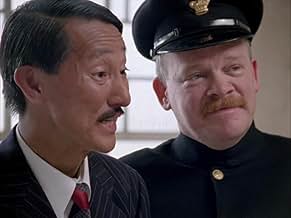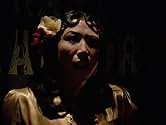The Lost Mine
- Episode aired Apr 30, 1991
- TV-14
- 50m
IMDb RATING
7.3/10
1.7K
YOUR RATING
Poirot investigates the disappearance of a Chinese-American who traveled to London to sell a valuable map.Poirot investigates the disappearance of a Chinese-American who traveled to London to sell a valuable map.Poirot investigates the disappearance of a Chinese-American who traveled to London to sell a valuable map.
- Director
- Writers
- Stars
Chris Walker
- First Officer
- (as Christopher Walker)
- Director
- Writers
- All cast & crew
- Production, box office & more at IMDbPro
Featured reviews
This time, we have Poirot trying to decipher the murder of a Chinese man in China Town. It's a story of betrayal, money, business, Opium and gambling. The Red Dragon Club is very exotic and ticks all the right stereotype boxes. You can see it's one of the older episodes, but it retains everything that's usual quality of the series, so it's amusing and enjoyable, especially with his indispensible team of Hastings, Japp and Miss Lemon.
As a child I played Monopoly in the late 60s/early 70s, with my siblings. All our 'men' the boot, dog, racing car, and top hat were all made of silver metal. I've never known them to be made of anything else.
I believe there is an error in this episode in that the monopoly set used by Poirot and Hastings has as its 'men' the little silver coloured items such as the top hat. But that was a later version of monopoly dating I think from the late seventies or the eighties.
The version in my house when I was a child dated from the fifties and had as its 'men' types of transport such as ship, car, motor bike, train and they were coloured such as blue and red, not silver. There may have been an earlier version in the thirties when this was set, but it was not the one using the silver 'men'.
I would be very grateful if someone could advise me on the contents of the monopoly sets going back to the 30s so that it might be possible to check back to what would have been in place in 1935 when this Poirot story was set.
This is a very simple and basic error of poor research but unfortunately the scenes with the monopoly set recur rather frequently through the whole programme and therefore it could not be re-recorded, as I initially thought when I saw the opening scene.
The version in my house when I was a child dated from the fifties and had as its 'men' types of transport such as ship, car, motor bike, train and they were coloured such as blue and red, not silver. There may have been an earlier version in the thirties when this was set, but it was not the one using the silver 'men'.
I would be very grateful if someone could advise me on the contents of the monopoly sets going back to the 30s so that it might be possible to check back to what would have been in place in 1935 when this Poirot story was set.
This is a very simple and basic error of poor research but unfortunately the scenes with the monopoly set recur rather frequently through the whole programme and therefore it could not be re-recorded, as I initially thought when I saw the opening scene.
"The Lost Mine" is one of the Agatha Christie mysteries first published in the U.S. and later in the U.K. It appeared in America in 1925 in the collection of short stories called "Poirot Investigates." It appeared in 1974 in the U.K. in the collection, "Poirot's Early Cases." This adaption for television in 1990 is the first of that kind. This is particularly relevant to a major aspect of this film. And, that is Hercule Poirot and Captain Hastings playing a game of Monopoly - the U.K. version with London street and place names. The game goes on throughout the story, between and during segments of the mystery case, which is about a murder.
Although I began reading Christie mysteries in the early 1960s, I haven't read this or most of her short stories. So, I don't know if the Monopoly game might have been added by Christie to the story for its 1974 publication in the U.K., or if it was added entirely by the playwrights for the film. If the latter, it might have been in place of another board game. That's because the London version of Monopoly didn't come out until 1936. Indeed, a close look at the board in this film shows that it is a very early edition, in excellent condition. Under the title on the board, it reads, "Patent applied for No. 3795/36."
Monopoly was first produced and marketed as a game by Parker Brothers in America in 1935. It sold the rights for European production and sales to Waddington Games the next year. The English company changed the street and place names to those in London, and first marketed that version in 1936. For instance, the high rent places of Boardwalk and Park Place on the America game edition are changed to Mayfair and Park Lane on the London board.
But the setting for this film is August 1935. When the Chinese businessman signs the hotel registry as Wu Ling, he writes the date as 8/2/35. That's a clue Poirot later points out as pegging the Chinaman as an American. The two entries in the ledger above his are dated 2-8-35 and 2nd Aug., respectively.
All of that aside, this film is not up to the usual quality of a griping and entertaining Christie mystery. The number of principals is very small and the case isn't very complex. Except for a subplot involving opium use and dens that apparently were legal in that day, the story isn't up to the level of intrigue one is accustomed to with Poirot. The red herring of the subplot is the only thing that keeps one's interest in the story. That's because of the sojourns to London's Chinatown.
Who knew that London had a Chinatown? Although it would make sense to assume that all cities with a few million population would have such. Still, one seldom would hear or read anything about a Chinatown outside the big ones of Los Angeles or San Francisco. In 1935, this would have been the original Chinatown of London. It was all but destroyed in the World War II Nazi bombing blitz. After that, Chinese establishments dispersed over London, and a smaller new Chinese section gradually formed in a more upscale area. Anyhow, so one learns in reading about it.
One other thing that helps provide some life to this story is the portrayal of the then-new police radio control network and system. Inspector Japp is only too happy to demonstrate it to Poirot and Hastings. The large room has female police employees who move toy cars along the streets of London as radio reports come in. The whole thing resembles a war room in combat.
Here are some favorite lines from the film.
Hercule Poirot, "If you put your head in the mouth of a lion, you cannot complain if one day he bites it off, huh?"
Hercule Poirot, playing Monopoly, "I will build a hotel on Fenchurch Street." Captain Hastings, "You can't build a hotel on a railway station." Poirot, "Don't be absurd, Hastings. There are plenty of hotels at railway stations." Hastings, "But, that's not in the rules." Poirot, "Well, then, Hastings, the rules are wrong."
Hercule Poirot, "The Americans always put the month before the date, Hastings." Captain Hastings, "Ah!" Poirot, "Yes, they're very backward people."
Charles Lester, "When I read about the murder, you see... this kind of thing - it's, uh, not exactly good for business." Inspector Japp, "Right now, it's not exactly good for you."
Although I began reading Christie mysteries in the early 1960s, I haven't read this or most of her short stories. So, I don't know if the Monopoly game might have been added by Christie to the story for its 1974 publication in the U.K., or if it was added entirely by the playwrights for the film. If the latter, it might have been in place of another board game. That's because the London version of Monopoly didn't come out until 1936. Indeed, a close look at the board in this film shows that it is a very early edition, in excellent condition. Under the title on the board, it reads, "Patent applied for No. 3795/36."
Monopoly was first produced and marketed as a game by Parker Brothers in America in 1935. It sold the rights for European production and sales to Waddington Games the next year. The English company changed the street and place names to those in London, and first marketed that version in 1936. For instance, the high rent places of Boardwalk and Park Place on the America game edition are changed to Mayfair and Park Lane on the London board.
But the setting for this film is August 1935. When the Chinese businessman signs the hotel registry as Wu Ling, he writes the date as 8/2/35. That's a clue Poirot later points out as pegging the Chinaman as an American. The two entries in the ledger above his are dated 2-8-35 and 2nd Aug., respectively.
All of that aside, this film is not up to the usual quality of a griping and entertaining Christie mystery. The number of principals is very small and the case isn't very complex. Except for a subplot involving opium use and dens that apparently were legal in that day, the story isn't up to the level of intrigue one is accustomed to with Poirot. The red herring of the subplot is the only thing that keeps one's interest in the story. That's because of the sojourns to London's Chinatown.
Who knew that London had a Chinatown? Although it would make sense to assume that all cities with a few million population would have such. Still, one seldom would hear or read anything about a Chinatown outside the big ones of Los Angeles or San Francisco. In 1935, this would have been the original Chinatown of London. It was all but destroyed in the World War II Nazi bombing blitz. After that, Chinese establishments dispersed over London, and a smaller new Chinese section gradually formed in a more upscale area. Anyhow, so one learns in reading about it.
One other thing that helps provide some life to this story is the portrayal of the then-new police radio control network and system. Inspector Japp is only too happy to demonstrate it to Poirot and Hastings. The large room has female police employees who move toy cars along the streets of London as radio reports come in. The whole thing resembles a war room in combat.
Here are some favorite lines from the film.
Hercule Poirot, "If you put your head in the mouth of a lion, you cannot complain if one day he bites it off, huh?"
Hercule Poirot, playing Monopoly, "I will build a hotel on Fenchurch Street." Captain Hastings, "You can't build a hotel on a railway station." Poirot, "Don't be absurd, Hastings. There are plenty of hotels at railway stations." Hastings, "But, that's not in the rules." Poirot, "Well, then, Hastings, the rules are wrong."
Hercule Poirot, "The Americans always put the month before the date, Hastings." Captain Hastings, "Ah!" Poirot, "Yes, they're very backward people."
Charles Lester, "When I read about the murder, you see... this kind of thing - it's, uh, not exactly good for business." Inspector Japp, "Right now, it's not exactly good for you."
A Chinese man arrives at a London hotel; he has with him the map to a long-considered "lost" mine, and he has agreed to sell the map to an English bank. But the next day he doesn't turn up at the time of the meeting; in fact, after a few hours, he turns up dead. The president of the bank asks Hercule Poirot for help.
Apart from the Oriental flavor (it's partly shot in London's Chinatown), and a brief look at Scotland Yard's methods in the 1930's, this is for the most part a rather trivial episode of the Poirot series. But it is saved at the end by the startling revelation of the killer's identity. Up until then, it's a ** out of 4, but the last 5 minutes make it a ***. One of the clues is so obvious in retrospect that you may feel like hitting your head on the wall if you miss it (and I did....miss it , I mean).
Apart from the Oriental flavor (it's partly shot in London's Chinatown), and a brief look at Scotland Yard's methods in the 1930's, this is for the most part a rather trivial episode of the Poirot series. But it is saved at the end by the startling revelation of the killer's identity. Up until then, it's a ** out of 4, but the last 5 minutes make it a ***. One of the clues is so obvious in retrospect that you may feel like hitting your head on the wall if you miss it (and I did....miss it , I mean).
Did you know
- TriviaThe "war room" tracking the car for Scotland Yard is based on the RAF war rooms of WW2, right down to the cue sticks moving cars instead of airplanes.
- GoofsLord Pearson tells Poirot and Hastings that a lump of ore can be refined into "top grade twenty-four karat silver". But the karat is a unit of purity for gold, not other precious metals. Silver purity is measured in parts per thousand, with pure silver being 999.
- Quotes
Chief Inspector Japp: Charles Lester? We tried him twice this morning. He was out.
Hercule Poirot: Well, it may be of no worth...
Chief Inspector Japp: Look, be my guest. For the moment, I've got more important fish to fry.
Hercule Poirot: Well, Hastings, while the Chief Inspector is frying his important fish, let us see what we can catch, eh?
- ConnectionsReferences George White's Scandals (1935)
Details
- Release date
- Country of origin
- Official sites
- Language
- Filming locations
- Columbia Road, London, E2, England, UK(Chinatown)
- Production companies
- See more company credits at IMDbPro
- Runtime50 minutes
- Color
- Aspect ratio
- 1.33 : 1
Contribute to this page
Suggest an edit or add missing content



